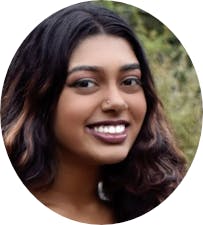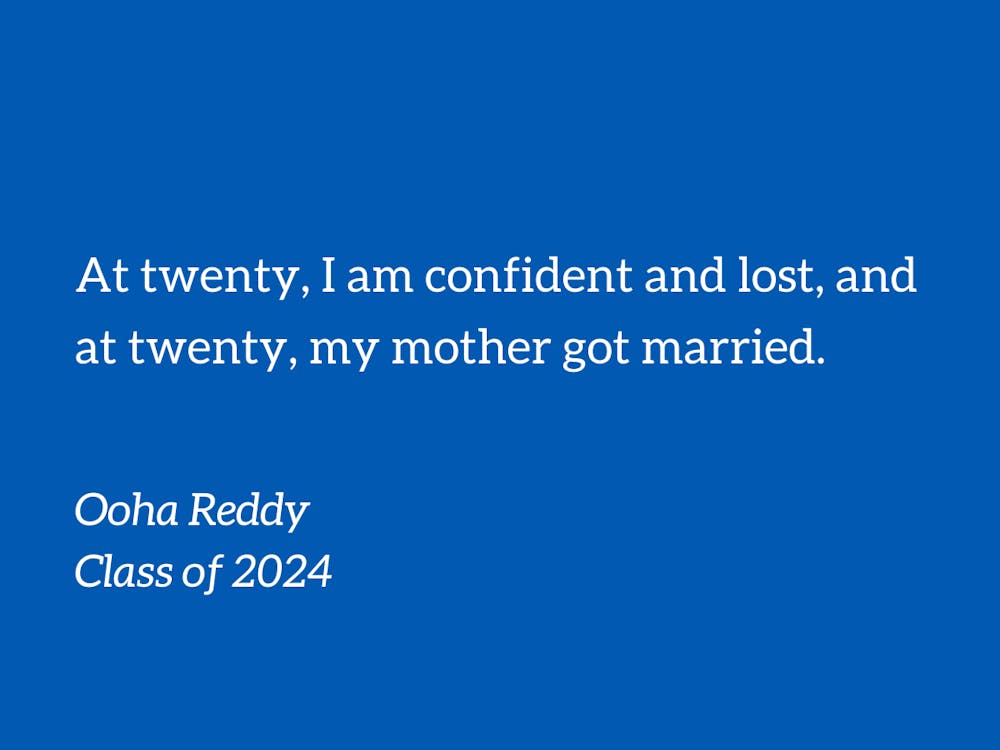I’m pretty young for my year, the youngest of my friends—I'm a junior and still twenty years old, will be until September. I’ve celebrated friends’ 21st birthdays since roughly October, yet I still have some time to go.
At twenty, I am in my third (and unfortunately, last) year at Duke. I live across the country from my family back home in California and built a new home of my own within my life here in Durham. At twenty, I have loved, feared, been ashamed of, and reconnected again with my culture. Over twenty years, I have pursued perhaps every possible career path before finding a niche that actually makes my eyes light up and my heart race. I fell in love with dance until I forgot who I was without it and then found myself all over again. Twenty years have seen me travel more of the world than I could have ever dreamed, make friends I could call my siblings, and live a life I couldn’t have even imagined for myself.
But at twenty, I still grapple to understand the realities and truths of my parents’ separation, and what that has meant for me. I often find myself in the crossfire of my mother, father, and sister, sacrificing bits and pieces of myself to maintain peace while still choosing the battles I wish to fight. I hide here in Durham, declining calls citing busy schedules, and sending the occasional update text. Despite it being a favorite conversation topic of the third-years around me, I don’t know clearly what even the immediate future holds, thanks to DKU. I am twenty and still can’t talk to my little sister because of a row about our parents. After twenty years of growth, passion, and ambition, I will never be able to dance safely again due to a misdiagnosis in high school (as many know, I didn’t really end up listening to that sound piece of medical advice). I have been incredibly fortunate, yet I have lost so much that the world will never know and that I can never truly share.
At twenty, I am left holding the glass shards of everything that went wrong. I have held grudges against my parents for things they both couldn’t have possibly helped—and perhaps some they could’ve, too. I hide from them when I need to reserve strength, and shield my uncertainties and doubt behind a wall of blunt truth. Twenty years have given me ample time to harbor blame and resentment.
At twenty, my mother got married. She went behind her mother’s, my ammamma’s, back and asked her grandparents to arrange a match. My twenty-year-old mother found a sense of responsibility as my great-grandmother’s health rapidly declined. She grew up in India for twenty years, surrounded by a vibrant family of cousins and aunts and uncles. But her grandmother’s greatest wish was to see my mother married before she passed, and my mother loved her dearly. So her marriage to my father, a total stranger, was fixed, and she left India to move to Fremont, California, where her new husband worked. In an unfamiliar place, she began a new life apart from the family, friends, and country she had always known.
At twenty, my mother strained her birthright connection to her motherland, which was now so far away. She spent the next thirty or so years grappling with the remnants of that bond, learning what to hold on to and what to let go. My mother doesn’t know the India that has existed since her twentieth year. She is as much of a tourist as I am, grasping for a glimpse of the home she once knew. At twenty, my mother married a man she didn’t know; she discovered eventually knowing him also came with its own price. She condemned herself to a marriage she would regret for years as it blew up her life bit by bit, landmines meticulously placed until they all detonated each other simultaneously She forewent love and respect to see her grandmother satisfied. At twenty, she did not know what was to come—only what she could do at that specific crossroads.
At twenty, she was so brave but so young. And yet, at twenty, we make choices that shape our lives.
At twenty, I am confident and lost, and at twenty, my mother got married.
So at twenty, I have learned to forgive my mother. I acknowledge my own bank of experiences while realizing that I, too, am so young, and have so much more to understand about life. My choices will shape my life in ways I cannot even fathom right now, and if I am to forgive myself, as I undoubtedly will have to, I must forgive her. For my mother was only twenty when she chose to fulfill her grandmother’s wishes and leave her entire life behind.
At twenty, we don’t understand what’s coming thirty years down the line. My mother could only pass on to me whatever culture she absorbed in twenty years, whatever pride she herself could retain. I will always be lost in India, as she is, and I will always be confused about what parts of my culture I can claim and what still remains too far away from my grasp. But that is not her sin.
At twenty, my mother did not see the ways her choices would affect me. She did not see the role I would play and the charades I would master. My parents’ separation taught me the large community of family and friends I grew up with were never actually mine—they were theirs, and their split splintered everything beyond repair. That’s a life I will never get back. But that is not her sin.
At twenty, we are silly, we are small, and we do what we must. My mother and I seemingly share this curse—we choose the necessities of the now, for what do we know of the future at just twenty years old?
Ooha Reddy is a Duke Kunshan junior studying in Durham. Her column “The Rage Room” runs Fridays.
Get The Chronicle straight to your inbox
Signup for our weekly newsletter. Cancel at any time.

Ooha Reddy is a Duke Kunshan University junior and an opinion managing editor of The Chronicle's 118th volume. She was previously an opinion managing editor for Volume 117.

